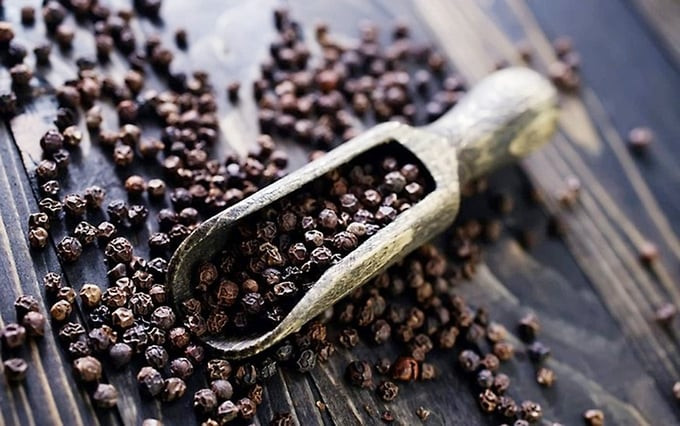Pepper price today January 10, 2025: Shocking decrease, pepper price under 150,000 VND
Today's domestic pepper price, January 10, is at 147,000 - 149,000 VND/kg. A shocking decrease of 1,000 to 4,000 VND/kg compared to yesterday. Vietnam's pepper export price has slightly decreased compared to yesterday.
Domestic pepper price today
The highest pepper purchase price in key pepper growing areas (Dak Lak, Lam Dong, Gia Lai, Dak Nong, Ba Ria - Vung Tau, Binh Phuoc) was recorded at 149,000 VND/kg.
Specifically, in Dak Nong province, pepper price is at 148,000 VND/kg. A shocking decrease of 3,000 VND/kg compared to yesterday.
In Gia Lai, pepper price is 147,000 VND/kg. Decreased 3,000 VND/kg compared to yesterday.
In Dak Lak, pepper price is 147,000 VND/kg. A shocking decrease of 4,000 VND/kg compared to yesterday.
In Binh Phuoc and Dong Nai, pepper price today is at 149,000 VND/kg. Decreased 1,000 VND/kg compared to yesterday.
In Ba Ria - Vung Tau, pepper price today is at 149,000 VND/kg. Decreased 1,000 VND/kg compared to yesterday.
Thus, pepper prices today dropped dramatically in the Central Highlands, slightly in the Southeast, and in the domestic market, currently the lowest price is 147,000 VND/kg.

Climate change is having a significant negative impact on coffee and pepper production, two important crops in Vietnam’s agricultural sector. Extreme weather events are reducing the yield and quality of these crops.
Changes in rainfall patterns, resulting in prolonged droughts in the dry season and heavy rains causing floods in the wet season, have severely affected the growth of coffee and pepper. These changes have reduced yields and made crops more susceptible to pests and diseases, while increasing production costs as farmers have to invest more in measures to prevent natural disasters and pests.
In addition, rising temperatures also adversely affect the growth and flowering of crops, reducing the quality of coffee and pepper beans. These changes cause economic losses to farmers, affecting the supply chain and market prices.
World pepper price today
In the world market, based on quotes from export enterprises and export prices in various countries, the International Pepper Association (IPC) has updated the prices of pepper of all types traded in the international market on January 10 (local time) as follows:
Indonesian Lampung black pepper prices remained unchanged from yesterday at $6,838/ton. Meanwhile, Muntok white pepper prices remained unchanged from yesterday at $8,949/ton.
Brazilian black pepper ASTA 570 price remained unchanged from yesterday at USD 6,350/ton (up 0.39%).
Malaysia's ASTA black pepper price remained unchanged from yesterday at $8,500/ton. In addition, the country's ASTA white pepper price also remained unchanged from yesterday at $10,700/ton.
Prices of all types of pepper in Vietnam remained unchanged compared to yesterday. Of which, the price of Vietnamese black pepper 500 gr/l reached 6,350 USD/ton; 550 gr/l reached 6,650 USD/ton.
Similarly, Vietnam's white pepper price remained unchanged from yesterday at $9,550/ton.
According to experts, the pepper market is currently quite quiet, with low transactions. Farmers, agents and exporters are limiting sales and holding on to goods, hoping that prices will increase sharply after Tet. Therefore, the supply of pepper for export in January and February 2025 will be very limited.
This year's main harvest is expected to be delayed until March or April due to climate change, which will put pressure on existing inventories.
In 2024, Vietnam will export a total of 250,600 tons of pepper, including 220,269 tons of black pepper and 30,331 tons of white pepper. Export turnover will reach 1.32 billion USD, up 45.4% compared to 2023, although export volume will decrease by 5.1%.
In 2024, Vietnam imported 36,727 tons of pepper, with a turnover of 176.2 million USD. The three largest pepper suppliers to Vietnam are Indonesia, Brazil and Cambodia. Of which, imports from Indonesia and Cambodia increased sharply, while imports from Brazil decreased.
